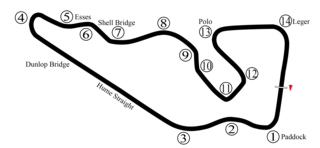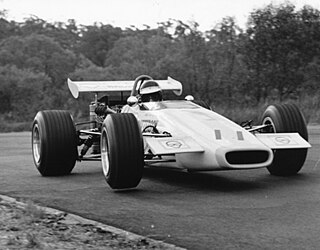
Australian Formula 2, sometimes abbreviated to AF2 or ANF2, is a "wings and slicks" formula racing category in Australia. The category is one of Australia's oldest, dating back to 1964. The current format of AF2 was introduced in 1978. Brian Shead of Cheetah Racing Cars and Garrie Cooper of Elfin Racing Cars were largely responsible for the development of the format, which was devised to suit the needs of Australian drivers, most of whom had little or no sponsorship and had to bear the costs of racing out of their own pockets.

Mallala Motor Sport Park is a 2.6 km (1.6 mi) bitumen motor racing circuit near the town of Mallala in South Australia, 55 km north of the state capital, Adelaide.
The 1975 Australian Drivers' Championship was a CAMS sanctioned Australian motor racing title open to Australian Formula 1 cars and Australian Formula 2 cars. The championship winner was awarded the 1975 CAMS "Gold Star". The title, which was the nineteenth Australian Drivers' Championship, was won by John McCormack driving an Elfin MR6 Repco-Holden.
Australian Formula 3 has been the name applied to two distinctly different motor racing categories, separated by over twenty years.

Warwick Farm Raceway was a motor racing facility which was in operation from 1960 to 1973. Warwick Farm Raceway hosted numerous major events during its life such as the Australian Grand Prix and rounds of both the Australian Touring Car Championship and the Tasman Series.

The Lowood Airfield Circuit was a motor racing venue in Queensland, Australia. The circuit, which was used from 1946 to 1966, was located at a former wartime airfield site at Mount Tarampa, near Lowood, 72 km west of the state capital Brisbane. It utilised the airfield’s runway for its 1.9 km long 200 metre wide main straight and also used various taxiways and tarmac from the old hangar area. Lap distance was 4.54 km (2.82 mi).

The 1968 Australian Grand Prix was a motor race held at Sandown Park in Victoria, Australia on 25 February 1968. The race was open to Racing Cars complying with the Australian National Formula or the Australian 1½ Litre Formula. It was the thirty third Australian Grand Prix and was also round seven of the 1968 Tasman Series. The race was staged by the Light Car Club of Australia and was sponsored by the Royal Automobile Club of Victoria.

The 1967 Australian Touring Car Championship was a CAMS sanctioned national motor racing title open to Group C Improved Production Touring Cars. It was contested over a single race, staged at the Lakeside Circuit in Queensland, Australia on 30 June 1967. The title, which was the eighth Australian Touring Car Championship, was won by Ian Geoghegan, driving a Ford Mustang.

The 1964 Australian One and a Half Litre Championship was a CAMS sanctioned motor racing title for drivers of Australian 1½ Litre Formula racing cars. The title was contested over a 34 lap, 76½ miles (123 km) race held at the Warwick Farm circuit in New South Wales, Australia on 6 September 1964. This was the first national title for the Australian 1½ Litre Formula which was in its first year of existence.
The 1970 Australian Drivers' Championship was a CAMS sanctioned motor racing title for drivers of Australian Formula 1 and Australian Formula 2 racing cars. The winner of the title, which was the fourteenth Australian Drivers' Championship, was awarded the 1970 CAMS Gold Star.

The 1971 Australian Formula 2 Championship was a CAMS sanctioned motor racing title for drivers of Australian Formula 2 racing cars. It was the fifth Australian Formula 2 Championship.
The 1965 Australian Drivers' Championship was a CAMS sanctioned Australian national motor racing title open to racing cars complying with the Australian National Formula or the Australian 1½ Litre Formula. The title was contested over a six race series with the winner awarded the 1965 CAMS Gold Star. It was the ninth Australian Drivers' Championship.
The 1967 Australian Drivers' Championship was a CAMS sanctioned Australian motor racing title for drivers of cars conforming to Australian National Formula or Australian 1½ Litre Formula regulations. The winner of the championship was awarded the 1967 CAMS Gold Star. It was the 11th Australian Drivers' Championship to be awarded by CAMS.
The 1969 Australian Drivers' Championship was a CAMS sanctioned Australian motor racing title for drivers of cars conforming to Australian National Formula or Australian Formula 2 regulations. The championship was contested over a six race series with the winner awarded the 1969 CAMS Gold Star. It was the thirteenth Australian Drivers' Championship to be awarded by CAMS.

The 1965 Australian Formula 2 Championship was a CAMS sanctioned motor racing title open to Racing Cars complying with Australian Formula 2. The championship was contested over a single, 34 lap, 76.5 mile (123 km) race at the Warwick Farm circuit in New South Wales, Australia on 19 September 1965. It was the second Australian Formula 2 Championship to be awarded.
The 1973 Australian Formula 2 Championship was a CAMS sanctioned motor racing title open to Australian Formula 2 racing cars. It was the seventh Australian Formula 2 Championship to be awarded by CAMS.

The 1962 Australian Formula Junior Championship was a CAMS sanctioned motor racing title open to Formula Junior racing cars. The championship was contested over a single 30 lap, 60 km race, staged at the Catalina Park circuit at Katoomba in New South Wales, Australia on 28 October 1962. The title, which was the inaugural Australian Formula Junior Championship, was won by Frank Matich, driving an Australian built Elfin.

The 1965 Australian Tourist Trophy was a motor race staged at the Lakeside circuit in Queensland, Australia on 14 November 1965. It was the ninth annual Australian Tourist Trophy race. The race was open to sports cars as defined by the Confederation of Australian Motor Sport (CAMS) in its Appendix C regulations, and it was recognized by CAMS as the Australian championship for sports cars. It was won by Ian Geoghegan driving a Lotus 23b.

The 1963 Australian Tourist Trophy was a motor race staged at the Lowood circuit in Queensland, Australia on 9 June 1963. It was the seventh annual Australian Tourist Trophy race, and it was recognized by the Confederation of Australian Motor Sport as the Australian championship for sports cars. The race, which was organised by the Queensland Racing Drivers' Club, was won by Ian Geoghegan, driving a Lotus 23.

The 1964 Australian Tourist Trophy was a motor race staged at the Longford Circuit in Tasmania, Australia on 29 February 1964. It was the eighth annual Australian Tourist Trophy race. The race was open to sports cars as defined by the Confederation of Australian Motor Sport (CAMS) in its Appendix C regulations, and it was recognized by CAMS as the Australian championship for sports cars. It was won by Frank Matich driving a Lotus 19B.










